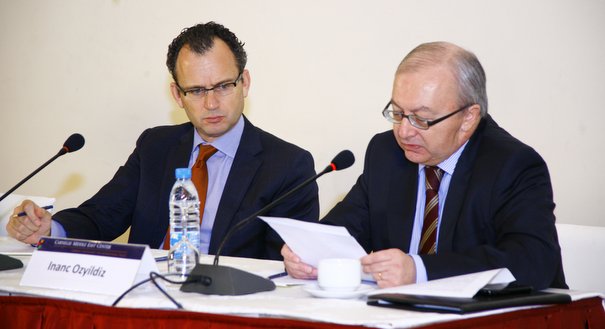Registration
You will receive an email confirming your registration.
Turkey’s “zero problems” foreign policy has received a great deal of international attention, and Turkey has been held up as an example of secularism, democracy, and economic development. Now, however, Turkey finds itself in a turbulent and rapidly changing Middle East. Its relations with once-friendly states have turned sour and aftershocks of the Arab Spring have increased tensions in the region. To discuss and explore the perceptions and realities of Turkey’s role in a changing region, the Carnegie Middle East Center and the Turkish Economic and Social Studies Foundation (TESEV) co-hosted a conference in Beirut.
Winning the Popularity Contest
For many in the region, Turkey is seen as an exemplary country that has effectively enacted economic and political reforms, Mesut Özcan of the Ministry of Foreign Affairs of Turkey explained. In 2009, TESEV conducted a survey on perceptions of Turkey in several Middle Eastern countries and found that a large percentage of the population held generally favorable opinions, Sabiha Senyücel Gündoğar of TESEV added. In 2011, the survey was expanded to include 16 Middle Eastern countries and again reported positive results. Responding to questions concerning Turkey’s role in the Middle East, its impact on regional politics, the attractiveness of the Turkish model, and Turkey’s combination of Islam and democracy, more than 70 percent of answers were favorable.
Turkey’s Realignment with the Middle East
Perhaps the most remarkable aspect of these results, Gündoğar explained, is that no one would have even considered conducting such a survey only two decades ago. Timur Goksel of Al-Monitor agreed, saying that when he arrived in Lebanon in 1979, Turkey was politically, culturally, and linguistically separate from the Middle East. Around 2000, as Turkish society grew more participatory and democratic, the government began integrating itself in regional political and trading partnerships while accepting a bigger international role, added Gündoğar.
Influence of the Arab Spring
The rapid political changes and instability taking place in the Arab Spring have forced Turkey to make rapid, drastic changes in positions and policies, the speakers agreed.
- Supporting the People: Despite the country’s former ties with now-ousted Arab leaders, Turkey has rarely hesitated to align itself with the Arab people since the onset of popular demonstrations, Inanc Orylidiz, the Turkish ambassador to Lebanon, asserted. He added that official policies of non-interference should not be confused with neutrality. The ascent of democratic governments in the region will also benefit Turkey, Özcan contended, as it will allow for greater co-operation between countries and establish an atmosphere more conducive to peace and stability.
- Syria: The ongoing crisis in neighboring Syria is an immediate challenge to Turkey’s internal stability, the speakers agreed. The Turkish government has cut ties with the Syrian regime, but violence near the border and the downing of a Turkish jet over Syrian waters are testing Ankara’s policies of non-interference. Additionally, the conflict’s duration is disrupting economic activity and threatens Turkey’s relations with its own minority Kurdish population, added Carnegie’s Maria Fantappie.
- A Changed Game: Although it is too soon to know the sum effect of the Arab Spring, Gündoğar argued that the old system will not return, resulting in an increase in Turkey’s regional influence. Şaban Kardaş of TOBB Economy and Technology University demurred, suggesting that in addition to drastically changing the regional order and increasing security threats, the Arab Spring demonstrated the limits of Turkey’s power, in particular its inability to predict the downfall of many old regimes.
Regional Relations and Tensions
The Turkish Justice and Development Party adopted a “zero problems” foreign policy in recognition of the importance of internal and regional stability to Turkey’s continued economic development, Wassim Kalaajieh of the Wasatiya Forum explained. Turkey has consistently used non-coercive, soft power methods to promote that stability, but rising regional tensions present a serious challenge to the durability of cultural diplomacy and mediation.
- Turkey at a Crossroads: Kardaş reminded the audience that Turkey’s geographic location gives it important relations not only with the Middle East, but also with Europe, the Balkans, and the Caucusus. In addition to Turkey’s attempts to join the European Union, Muhittin Ataman of Abant Izzet Baysal University explained that it has sought to broaden its engagement since September 11, 2001 by initiating political and economic openings in the Caucasus, the Balkans, and the larger Middle East.
- Dangerous Neighborhood: Turkey shares borders with Syria, Iraq, and Iran, a dangerous neighborhood that necessitates a careful political balancing act, Gündoğar said. Turkey also pays close attention to developments in Palestine, Özcan added, recognizing the establishment of a Palestinian state as a precondition to regional stability.
- Turkey and the Gulf: Turkey’s emergence as a regional power is welcome among Gulf countries looking to counter Iran’s influence, explained Ataman and Mustafa Alani of the Gulf Research Center. Both Turkey and the Gulf countries recognize that regional stability is necessary for their continued economic growth and trade between the two has increased exponentially over the past decade, Ataman stated.
- Sectarian Neutrality: Though surrounded by Shia countries and valued by other governments as a potential counterweight to Shia Iran, Turkey must work to avoid the perception of aligning with Sunnis in regional sectarian conflicts, Goksel emphasized. He added that Turkey must emphasize its secularism and neutrality to guard against the perception of Turkey as a Sunni country combating Shias.
